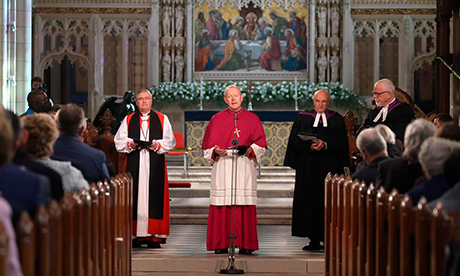Leaders of Ireland’s Christian churches presented a united front during a ceremony marking 100 years of partition of Ireland.
The ecumenical service at the Church of Ireland cathedral in Armagh was billed as a neutral “reflection” on the island’s division into a British north and independent south a century ago.
The 1921 partition came amid guerrilla warfare in the south and rising sectarian bloodshed in Belfast.
“For the past 100 years, partition has polarized people on this island. It has institutionalized difference, and it remains a symbol of political, cultural and religious division between our communities,” said Catholic Archbishop Eamon Martin, whose overwhelmingly Irish nationalist flock seeks an end to partition.
Martin was joined at the ceremony by other Christian leaders, including the heads of the Church of Ireland (Anglican), Methodist Church, Presbyterian Church, and the Irish Council of Churches.
The Christian church leaders vowed to face “difficult truth” and work closer together to ensure that the fragile peace process in Northern Ireland leaves a lasting legacy of reconciliation.
The three Protestant leaders, whose churches, like the Catholics, never recognized partition and maintained all-Ireland structures, said they had taken too few risks during three decades of bloodshed over Northern Ireland and the two most recent decades of relative peace.
“I grieve the times when fear has held us back from building relationships,” said the Presbyterian moderator, David Bruce.
“I am sorry that as disciples of Jesus Christ we didn’t do more to be peacemakers,” said Church of Ireland Archbishop John McDowell. He took a sideways jab at current UK efforts to retreat from the Northern Ireland trade protocol and Irish nationalists’ desire to overpower British unionist objections to an all-Ireland state.
“We obsessed about some things, especially borders. We are obsessing about them again and being distracted from really thinking about what a good society would look like,” McDowell said.
The Irish Methodists’ Sierra Leone-born president, Sahr Yambasu, offered the most pointed critique of partition and Britain’s imperial past.
Yambasu, who studied in Belfast and settled in the Republic of Ireland in 1995, said he came from a land whose citizens once “were bought and sold and used for profit” by colonial powers that recklessly partitioned Africa.
He said Thursday’s ceremony provided “an opportunity to lament, to say sorry, to imagine what could be, and to choose the way forward that can be mutually beneficial.”
Among the 300 guests were Irish Foreign Affairs Minister Simon Coveney and British Prime Minister Boris Johnson. Queen Elizabeth II had been due to participate in the service. However, on the eve of the event, the 95-year-old monarch had reluctantly accepted medical advice to rest rather than travel for the event.
Irish President Michael D. Higgins triggered a diplomatic furore by rejecting his invitation amid claims that it would be partisan and pro-British. That position appeared ill-informed as the sombre ceremony featured expressions of regret over past failures and calls for unity between communities across the island.
Sources
